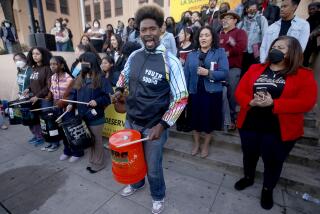Gore Gives After-School Care High Marks
WINNETKA â In a town hall meeting Saturday at Sutter Middle School, Vice President Al Gore emphasized the commitment of the Clinton administration to after-school programs, reiterating a previously announced plan to ask Congress for $1 billion in such funding to be used over the next five years.
Gore--who demurred when addressed as âthe next president of the United Statesâ saying, to much laughter, âI want to appear to discourage that commentâ--told the several hundred gathered at the invitation-only event that every school in the country needs after-school programs.
President Clinton and Gore were both in Monterey on Friday for the National Oceans Conference, where they announced an extended ban on offshore drilling on both coasts. Sen. Barbara Boxer (D-Calif.) told the crowd that the clouds parted and the sun shined for Clinton and Gore on Friday in Monterey and they did the same for Gore on Saturday.
âI think thereâs a message here. We like what youâre doing, and they like what youâre doing up there,â she said, pointing skyward.
Gore, who did not invoke divine intervention in his remarks, did tie the after-school initiative to his work to clean up the environment.
If more investment is not made in cleaning up the environment, community policing and after-school care, Gore said children might feel that the future is hopeless.
âIf they get the message subtly, but powerfully that we donât really care that much, then that changes their attitude toward the future of their own life,â he said.
Saturdayâs event, held in an idyllic courtyard framed by shade trees and washed by sunlight, seemed more like a forum than a town hall meeting. Gore did most of the talking, asking various community leaders and students to comment on the role of after-school programs in their lives.
The Clinton administration has pushed for after-school programs in recent months, in part motivated by the string of shootings on school campuses this year. Even though federal statistics show that most juvenile crime occurs between 3 and 8 p.m., studies show relatively few programs provide supervised activities during those hours. Teen pregnancy and drug use also have been tied to lack of adult supervision after school.
Until recently, however, the issue has received little national attention. The last time U.S. Department of Education officials studied formal after-school care--in 1991--they found that only 1.7 million students, less than 7% of children 5 to 13, attended after-school programs.
Brandon Carney, 14, a Sutter student who lives in Winnetka, told Gore he had been offered drugs while hanging out with friends after school. Brandon said he knew fellow students who got in trouble because they had nothing to do.
Gore told the crowd--who stayed for an afternoon workshop after the vice president departed for a private fund-raiser in Calabasas--that the needs outweigh the resources.
In one of the few off-agenda moments of the morning, Aureliano Cortes, a parent from South-Central Los Angeles, asked Gore about the passage of Proposition 227, which requires a one-year limit on native language instruction for non-English speaking students.
Cortes, who spoke in Spanish, thanked Gore for coming to Los Angeles. âDe nada,â replied Gore, who said the administration still believes that three years should be the bare minimum of native language instruction and planned to work âwithin the limits of the lawâ to make sure students received proper instruction.
Many were thrilled to be so close to the vice president. âWe never thought weâd see one of you here,â one Valley woman told the vice president.
Kim Skinner, 12, got to shake Goreâs hand.
âI was so excited,â said the Winnetka resident. Kim attends the after-school program at Sutter, part of a Los Angeles Unified School District program that serves 5,000 students at 25 of the districtâs 57 middle schools.
Kim said she thinks thereâs nothing uncool about staying at school longer.
âI like it,â she said. âYou can hang out with your friends longer.â
More to Read
Get the L.A. Times Politics newsletter
Deeply reported insights into legislation, politics and policy from Sacramento, Washington and beyond. In your inbox three times per week.
You may occasionally receive promotional content from the Los Angeles Times.











